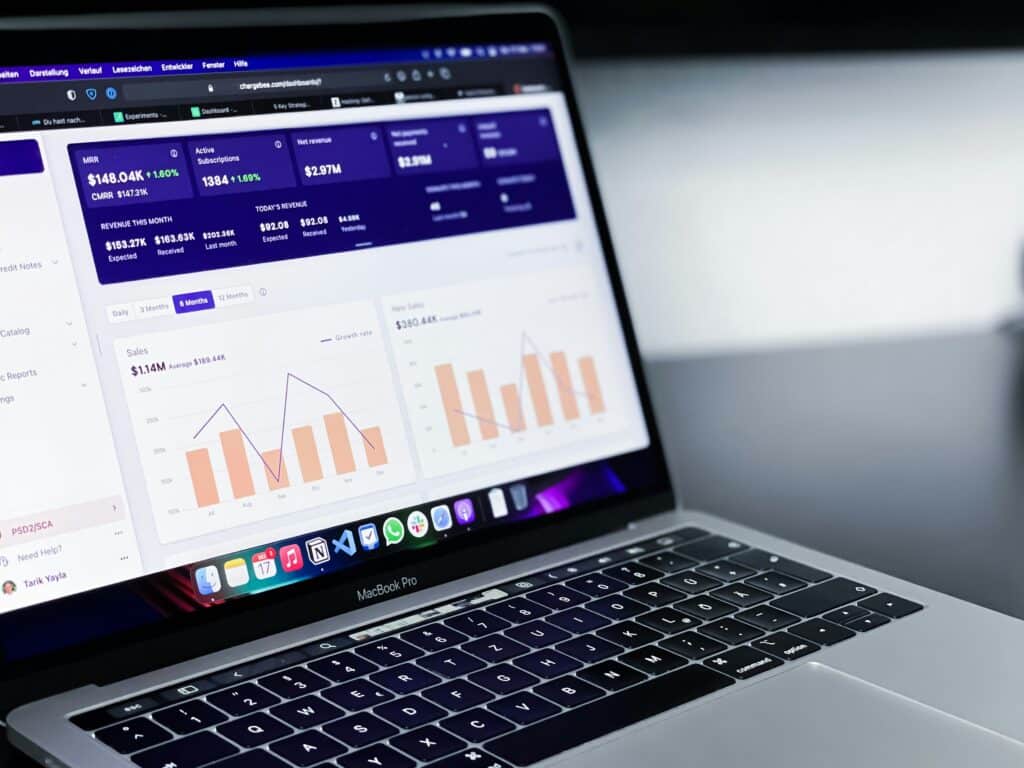Business analytics has emerged as the cornerstone of strategic planning and operational efficiency. By leveraging the vast quantities of data at their disposal, organizations can unveil critical insights that fuel informed decision-making.
The intersection of statistical analysis, predictive modeling, and data visualization tools enables businesses to identify trends, optimize processes, and foresee potential challenges. This article aims to unpack the multifaceted role of business analytics, outlining its importance in shaping the competitive landscape and driving sustainable growth.
IMAGE: UNSPLASH
Harnessing Data For Competitive Advantage
Understanding the market dynamics and consumer preferences has always been pivotal for businesses aiming to stay ahead of the competition. With business analytics, companies can sift through data to gain a deeper insight into market trends, patterns, and consumer behavior, turning raw data into a strategic asset.
The mining of such data allows for predictive analyses that can forecast market shifts, potentially positioning a company to lead rather than react.
Businesses that effectively harness and interpret their data enjoy a more ground-level view of their performance in comparison to the industry standard. They’re better equipped to tailor their strategies, operations, and offerings to meet the evolving needs of their market.
By doing so, they can identify unmet customer needs, inefficiencies in operation, and new avenues for growth.
What truly gives a competitive edge is the speed at which businesses can pivot and adapt by learning from the insights that data analytics provides.
Companies that are agile and receptive to change can quickly implement data-driven strategies, often resulting in improved customer satisfaction, loyalty, and ultimately, a stronger market position. You can find business analytics courses online to learn how to use data effectively and stay ahead of the curve.
It’s a valuable skill to have in today’s data-driven business landscape.
Optimizing Operational Efficiency
One of the most immediate areas where business analytics proves its worth is in operational efficiency. By analyzing workflow patterns, resource allocations, and production processes, companies can pinpoint bottlenecks and areas of waste. Through this lens, they can streamline operations, reduce costs, and enhance productivity.
Utilizing data analytics, businesses are able to conduct a thorough cost-benefit analysis of their operations. This can guide decision-makers to invest more wisely, manage inventory more effectively, and utilize human resources more strategically.
The intelligent use of analytics can lead to a leaner operation that not only cuts excess expenditure but also fosters a culture of continuous improvement.
Moreover, predictive analytics can aid in anticipating and mitigating operational risks. By forecasting potential disruptions, whether from machine failure or supply chain breakdowns, businesses can devise contingency plans. This preemptive approach minimizes downtime and secures business continuity, which is vital for customer retention and long-term success.
Enhancing Customer Experience
Understanding and enhancing customer experience is paramount. Business analytics provides tools such as sentiment analysis and customer segmentation to dissect customer feedback and behavior. These insights are crucial for creating personalized experiences that resonate with customers and build brand loyalty.
A data-driven approach allows for the identification of what customers truly value in products and services. By continuously analyzing customer interactions and responses, businesses can refine their offerings to better satisfy their customer base.
This commitment to satisfaction builds a loyal customer base that is less price-sensitive and more likely to provide valuable word-of-mouth promotion.
Furthermore, analytics can illuminate customer journey patterns, from the first point of contact to the post-purchase phase. By mapping this journey, companies can identify crucial touchpoints for improvements and innovations. In doing so, they prioritize their customer experience strategies, which can result in higher conversion rates and customer retention.
Fostering Innovation And Growth
Change is the lifeblood of innovation, and with business analytics, companies can foster a proactive culture of innovation. By analyzing market and internal data, organizations can uncover opportunities for new products, services, or market expansion.
Analytics can also facilitate the testing of new ideas through simulation and modeling, thereby reducing the risks and costs associated with innovation.
Understanding current trends and projecting future patterns empowers businesses to stay relevant and innovative. With data analytics, businesses have the toolkit to swiftly act on these insights, allowing them to maintain a dynamic approach to product development and service enhancements.
Growth often comes from entering new markets or expanding in current ones. Analytics can help identify the most lucrative opportunities based on consumer behavior and market conditions, enabling a data-driven approach to scaling the business. This strategic expansion, underpinned by concrete data, tends to result in more sustainable growth.
Strengthening Supply Chain Management
In an interconnected global economy, managing a supply chain efficiently can be the difference between profit and loss. Business analytics can serve as a key instrument in enhancing the transparency and responsiveness of the supply chain.
By predicting demand, analytics can facilitate better inventory management, leaner stock levels, and optimized logistic operations.
By monitoring and analyzing supplier performance data, businesses can reinforce their supply chain resilience. This might involve diversifying sources, renegotiating contracts, or consolidating purchases. Analytics provide the insight necessary to make these decisions with confidence, often leading to improved supply chain agility and cost reductions.
Real-time analytics enable quick responses to supply chain disruptions. Through the immediate interpretation of data signals, companies can pivot and adjust to changing circumstances before they escalate into larger issues. This responsive approach empowers businesses to maintain steady and reliable supply chain operations.
Business Analytics Is Driving Financial Performance
Business analytics plays a pivotal role in financial management by providing clarity and insight into financial performance. Metrics, forecasting, and trend analysis aid in understanding revenue streams, profitability, and cost structures. These insights help in crafting strategies for revenue growth and cost management.
By analyzing financial data, businesses can make more informed investment decisions, whether it’s in new technology, human capital, or market expansions. Predictive analytics can help assess the financial impact of these investments and strategize for the best outcomes.
By analyzing cash flow trends, businesses can develop more effective strategies for budgeting and financial planning. This leads to a more proactive approach to financial management, optimizing the allocation of financial resources across the organization.
Securing Business Through Data Governance And Compliance
In an era where data breaches can cause significant financial and reputational damage, ensuring robust data governance and compliance is vital. Analytics plays a key role in monitoring compliance with regulations and industry standards. This vigilance protects businesses from costly penalties and safeguards customer trust.
A comprehensive data governance strategy, informed by analytics, encompasses the policies, procedures, and technology needed to manage and protect data assets. By maintaining high data quality and integrity, businesses can ensure their analytics are reliable and trustworthy, leading to better decision-making.
As regulations evolve, analytics can help businesses stay ahead of the curve by providing insights into how regulatory changes might affect their operations. Compliance analytics can thus be a powerful tool for risk management and maintaining a clear ethical stance in the marketplace.
Business analytics is an indispensable tool for modern-day businesses. By harnessing data, organizations can gain a competitive edge, optimize operations, and enhance the customer experience. It also serves as a catalyst for innovation, growth, and financial performance.
IMAGE: UNSPLASH
If you are interested in even more business-related articles and information from us here at Bit Rebels, then we have a lot to choose from.


COMMENTS